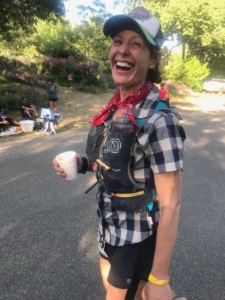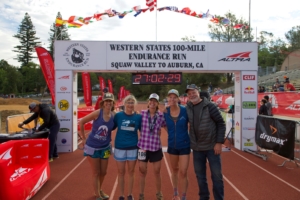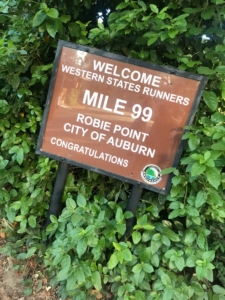SOU criminology professor completes ultra dream: Western States 100
SOU faculty member Alison Burke compared her feat to the experiences of her students after she recently achieved any ultramarathoner’s dream. She not only finished her first 100-mile race, but the race just happened to be the “granddaddy of them all” – the Western States Endurance Run.
“The big take away from this experience is really believing in and enjoying the process rather than measuring success based on the outcome,” she said – acknowledging that’s an easy thing to say after finishing the race (50 runners didn’t).
 But Burke said her long months of training for the race, and then enjoying the miles as she navigated the Western States course from Squaw Valley to Auburn, California, affected her more profoundly than the euphoria of the finish line.
But Burke said her long months of training for the race, and then enjoying the miles as she navigated the Western States course from Squaw Valley to Auburn, California, affected her more profoundly than the euphoria of the finish line.
“Anything can happen on race day – injury, illness or other unforeseen events,” she said. “It just so happened that everything went so smoothly for my race, but that’s not always the case.
“Building up to a race, there are marked improvements in fitness that should be celebrated. I can’t help but think of my students with this analogy. If they enjoy and focus on the process of learning rather that the outcome – the grade at the end of the term – then they will be happier and more fulfilled with their education.”
Burke, a criminology and criminal justice professor at SOU since 2008, earned her entry into Western States by volunteering at several previous years’ races. The event is limited by the U.S. Forest Service to 369 runners, and 5,862 entered a lottery to run in this year’s race.
The endurance run is a cornerstone event in the Grand Slam of Ultrarunning: the five oldest and most prestigious 100-mile trail races in the U.S. Western States was launched as its own event in 1978, though its roots go about six years deeper, when seven soldiers from Fort Riley, Kansas, participated on foot in the Western States Trail Ride. A handful of runners competed alongside the horses each of the next few years, until the 100-mile run became an independent event.
This year’s race began at 5 a.m. on Saturday, June 29, at the base of Squaw Valley Resort – just northwest of Lake Tahoe – and runners gained a total of 18,090 feet and descended 22,970 feet before finishing on the track at Auburn’s Placer High School.
Runners traverse snowfields atop Squaw Valley and some of the other peaks along the course, and often contend with 100-degree temperatures in the canyons of the American River.
“The hardest thing about the race was waiting for it to start,” Burke said. “Squaw Valley was a very intense place in the days leading up to the race. You can feel the energy, anxiety and excitement radiating off everyone in Olympic Village. It was actually very overwhelming.”
Burke has run more than 15 previous ultramarathon events, ranging from 50 kilometers to 100 kilometers (62 miles). But a jump to the 100-mile distance is difficult for many, in part because it requires running through the night for all but the fastest runners.
She worked with a running coach – Molly Schmelzle of Running Rabbit Endurance in Ashland – to prepare for the race, and said the experience helped her gear up both physically and mentally for the distance.
“It really is incredible what people can do when they put their mind to it,” Burke said. “A hundred miles is commonplace for many of the runners here in southern Oregon, but I never dreamed I’d be among the ranks. I was utterly petrified going into it.
“As Ellen Johnson Sirleaf (former Liberian president and first woman head of state in Africa) said, ‘If your dreams do not scare you, they’re not big enough.’”
 Burke was assisted during the race by a crew of four, including a pacer who accompanied her on the final 38 miles of the course. Her crew members – who were allowed by race rules to meet her at 10 of the 21 aid stations along the course – included two with SOU ties: Hannon Library’s systems librarian Jim Rible and Camille Siders, whose husband is business faculty member Mark Siders.
Burke was assisted during the race by a crew of four, including a pacer who accompanied her on the final 38 miles of the course. Her crew members – who were allowed by race rules to meet her at 10 of the 21 aid stations along the course – included two with SOU ties: Hannon Library’s systems librarian Jim Rible and Camille Siders, whose husband is business faculty member Mark Siders.
“I am utterly humbled by my crew, who were extraordinary and totally dialed in,” Burke said. “All I had to do is run. They had to navigate back roads, meet me at hot, dusty, crowded aid stations and keep my spirits high.
“They had a harder job than I did. I am so, so thankful to them!”
Her entire crew met Burke at the Robie Point aid station – just 1.1 miles from the finish –to wrap things up as a team.
 “We all ran to the finish together, laughing and smiling and feeling all the emotions of the race,” she said. “Another person who joined us was a woman I met (before the race) in Squaw Valley, who was volunteering at the Dusty Corners aid station (mile 38) and said she’d look for me on race day. I didn’t see her at the aid station when I ran through, so she went all the way to Robie Point to cheer me on!
“We all ran to the finish together, laughing and smiling and feeling all the emotions of the race,” she said. “Another person who joined us was a woman I met (before the race) in Squaw Valley, who was volunteering at the Dusty Corners aid station (mile 38) and said she’d look for me on race day. I didn’t see her at the aid station when I ran through, so she went all the way to Robie Point to cheer me on!
“This kind of support happened all day throughout the whole race – strangers going out of their way to help random runners get to the finish line.”
As she finished – in 26 hours, 52 minutes and 39 seconds – the loudspeaker announcer called out Burke’s name and described her as a criminology and criminal justice professor at SOU. A woman in the crowd approached and asked if Burke knew her daughter, who is an SOU student. She did, and the student’s mom got a picture of herself with the new 100-mile finisher.
Burke is one of 319 finishers of this year’s race, and the 32nd woman out of 65 who finished (22 didn’t). She was inspired by many of the other participants: a former second-place finisher at Western States who ran 91 miles of this year’s race on a prosthetic leg; the first blind runner to attempt the race; the event’s first transgender participant; and by the 20th Western States finish for 68-year-old Scotty Mills of California.
“But seriously, crossing that finish line at Placer High School was thrilling, exciting and amazing,” Burke said. “It’s known as the happiest place on earth for a reason!”
Post-race, she feels great – and ravenously hungry. She doesn’t have any other big races on her calendar for now, but will be returning the favor for her pacer next month, when she runs Colorado’s Leadville Trail 100 Run.
“It’s her turn to embrace the brutality, and my turn to be the tireless crew,” Burke said.

